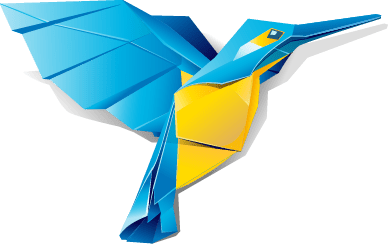 Mozaik Education has always aimed to create software and content that makes current hardware in schools more beneficial for education. Consider the following situation: if teachers have interactive boards, but don’t have any education-specific tools to use on that board, that interactive board is nothing more than very expensive wall decoration which teachers use to write notes on - exactly in the same way they used their traditional whiteboard. Plus maybe they will open one or two photographs from the Internet, helping them skip some trips to the printer. There’s no mistaking that the hardware has a lot of potential, but it’s our development team’s job to think about what we can create to enable that technology to make teachers’ jobs easier, make learning more exciting for students, and actually increase the effectiveness of the digital classroom.
Mozaik Education has always aimed to create software and content that makes current hardware in schools more beneficial for education. Consider the following situation: if teachers have interactive boards, but don’t have any education-specific tools to use on that board, that interactive board is nothing more than very expensive wall decoration which teachers use to write notes on - exactly in the same way they used their traditional whiteboard. Plus maybe they will open one or two photographs from the Internet, helping them skip some trips to the printer. There’s no mistaking that the hardware has a lot of potential, but it’s our development team’s job to think about what we can create to enable that technology to make teachers’ jobs easier, make learning more exciting for students, and actually increase the effectiveness of the digital classroom.
First there were interactive whiteboards. Many schools worldwide received funding to purchase the boards, but there was really no effect on education, in fact it was confusing for many teachers to have the hardware with no clear use or benefit. Now interactive panels are being seen more and more in schools, which is a more versatile technology. Now we are experiencing the rise of the tablet. Back in 2014, it was already reported that nearly 70% of schools in the UK had tablets for students to use, some schools even went as far as starting programs that would ensure one tablet per student. Besides tablet use in schools, one BBC article stated that 70% of students also had access to tablets at home.
As tablet use in education started increasing, we began to hear more questions about what our mozaBook software and mozaWeb platform could do for students with tablets. Our team immediately responded to this feedback by beginning to develop tablet applications for mozaBook. Tablets running the Windows operating system can actually run the fully-functional mozaBook software, in the very same way that it works on a PC. In fact, in Austria there is already a great education hardware/software package on the market called eduTab, an impressive combination the Microsoft tablet, Lemberger publications and the mozaBook platform.
Our latest release of the mozaBook application for tablets is for Android. mozaBook is already available on Google Play and this application allows students to use their teachers' presentations and digital textbooks right on their tablet, as well as run all of the interactive educational tools and game applications, interactive 3D scenes and videos within.
Along with this rise in tablet use for education comes a larger need for good classroom management functionality. mozaBook CLASSROOM includes a classroom management menu which allows teachers to start a virtual classroom. Once teachers start their classroom connection, they receive a code. The students simply open mozaBook and enter that code on their tablet to join the virtual classroom environment. Teachers can always see who is connected and who isn’t, as well as get screenshots any time, to make sure everyone is on track. Teachers can also share pages of a textbook or Exercise books (presentations) directly to students’ devices. In addition, teachers can send tools, games, tests, assignments, videos or images to students. Students can use that digital content and make basic notations.
mozaBook is a unique software that brings content together for teachers. Why is it unique, you ask? The edtech industry has created a lot of useful programs for digital classrooms over the last decade, but this has resulted in many tools made by many different developers, made for use on various platforms. This makes it rather difficult to navigate for teachers who already have very little time for lesson planning. mozaBook brings a large range of tools, games and content into one presentation software, allowing teachers to use our huge library of content, their own files, elements from the Internet and textbooks all into one program. It's a great way of tying all the elements of digital learning together.
One final note for all edtech and Android fans: several individual 3D models are available for download on the Google Play Store, so feel free to try our interactive content for free!
Multilingualism is one of the phenomena of the modern world, prompted by economic and cultural globalization. According to recent research there are more multilingual than monolingual people in the world. The situation when individuals are using one language at home, another one at work and yet another one while socialising with their friends is becoming a norm rather than an exception.
The European continent, with its fluid national borders in the past and growing economic and cultural integration in the present, is one of the places where duo and multilingual teaching systems are no longer a dream, but a reality and a strong necessity. Many European countries have more than one official language with Serbia being an absolute leader of the continent in this respect, recognising seven official languages; Belgium, Luxembourg and Switzerland following closely behind. Luxembourg has a unique educational system using three languages as the main instruction languages during the span of twelve years of schooling. However, even those European countries that only recognise one official language often have minorities that are either allowed to learn exclusively in their mother tongue or in both the official language and their native language. For example, there are plenty of Hungarian schools in Romania and parents can choose whether they want their children to be schooled exclusively in Hungarian or bilingually.
Many European countries have more than one official language with Serbia being an absolute leader of the continent in this respect, recognising seven official languages; Belgium, Luxembourg and Switzerland following closely behind. Luxembourg has a unique educational system using three languages as the main instruction languages during the span of twelve years of schooling. However, even those European countries that only recognise one official language often have minorities that are either allowed to learn exclusively in their mother tongue or in both the official language and their native language. For example, there are plenty of Hungarian schools in Romania and parents can choose whether they want their children to be schooled exclusively in Hungarian or bilingually.
Luckily enough, the modern education system gives even those children who were not exposed to a bilingual environment from the cradle an opportunity to become fluent in a foreign language. Languages are seen as one of the most important disciplines in many European schools and are taught from the first grade. Students in many countries also have an opportunity to learn a second foreign language at no additional cost.
Despite this continuous and truly impressive progress of expansion of the bilingual population in Europe, teaching languages remains a very challenging task. Although language teaching techniques have definitely advanced a lot in the last two decades, it seems that no one has yet found a golden technique that would help make every single student fluent in a foreign language. Some argue that no such technique can be developed when it comes to language learning. Instead, the main task of the teacher is to get off the beaten path and show students all the opportunities that speaking a foreign language offers. mozaBook is a powerful educational tool whether it is used for bilingual classrooms or to support the study of a foreign language. mozaBook is translated into 20 languages and the MULTILANG mozaBook license allows for the interchangeable usage of these languages. It is possible to switch the operational language at any point while running the software. mozaBook also contains educational tools that were specifically designed to help students learn foreign languages. For example, our Word finder and Lan(g)game tools are a fun way for students to learn new words, while our Spelling tool is a bottomless resource of spelling exercises to use in class. If these are still not enough, our 3D models can run in two languages simultaneously and become the center of attention in a bilingual classroom.
mozaBook is a powerful educational tool whether it is used for bilingual classrooms or to support the study of a foreign language. mozaBook is translated into 20 languages and the MULTILANG mozaBook license allows for the interchangeable usage of these languages. It is possible to switch the operational language at any point while running the software. mozaBook also contains educational tools that were specifically designed to help students learn foreign languages. For example, our Word finder and Lan(g)game tools are a fun way for students to learn new words, while our Spelling tool is a bottomless resource of spelling exercises to use in class. If these are still not enough, our 3D models can run in two languages simultaneously and become the center of attention in a bilingual classroom.
If you would like to incorporate fun and interactive language tools into your language classes or at your international school, you can learn more about MULTILANG mozaBook in our webshop.
We’re pleased to announce that mozaBook has been selected as a winner as Cool Tool in the Presentation Solution category of the 2016 EdTech Awards. mozaBook was also chosen as a finalist for two other categories of the competition: e-Learning, Blended Learning or Flipped Solution and Content Provider Solution.
The EdTech Awards are put on annually by edtech digest, an online publication with a U.S.-based team who has been writing stories and publishing information about the latest in education technology since 2010. Their mission is to “tell the story of 21st-century education transformation.” Among their work, they share interesting edtech products, interviews with influencers in education, compile special reports and resources all in the name of working to “reshape the education culture and to create a new and better future for students.”
The EdTech Awards highlights interesting edtech products, leaders in education technology, as well as products and companies setting trends in the industry.
Victor Rivero, Editor-in-Chief of EdTech Digest and the man who oversees the EdTech Awards, has the following to say about this year’s competition: "This year's program had some very stiff competition, hard decisions were made in selecting winners. The honorees here are among the best and brightest in the edtech space. Finalists and winners both represent an achievement. We're proud to honor these cool tools, leaders and trendsetters in education technology.”
To follow those kind words we’d just like to say that, here at Mozaik Education, we’re proud to be a part of the movement to help improve what edtech can do for learning, changing both how edtech is being used in schools and helping students learn more effectively...and of course while having some fun with technology at the same time!
Mozaik 3D scenes have been proven to be very effective in visualizing objects, phenomena, processes, and rules which are hard to illustrate with static images and hard to capture on videos, let alone imagine them. (For example, Cosmic or microbiological occurrences, or long destroyed historical landmarks. My personal favorite: the Van der Waals interaction on a gecko’s foot).
But to give support in other, not so 3D-friendly fields, our developers went a step further. For unusual topics such as probability, logic, or advanced spatial geometry, they have invented the 4th dimension by creating puzzles and exercises to be solved within our 3Ds.
 One good example of all the innovations claimed above would be our Constructing shapes 3D (above), in which the user is challenged to reconstruct a spatial object when we already know the front, side and top views.
One good example of all the innovations claimed above would be our Constructing shapes 3D (above), in which the user is challenged to reconstruct a spatial object when we already know the front, side and top views.
In another model, Light and shadow (below), the user can experiment by placing a light source near different spatial shapes in a room which is actually a 3D coordinate system. Depending on the type of light source, its placement and its distance from the shape, the shadow cast will differ dramatically. There are 8 different objects and two types of light to choose from in the coordinate system and the ability to rotate the 3D model and view the objects and shadows from different perspectives provides a great demonstration for students of art and physics alike.
 For statistics and probability (besides the best tool in the world (probably!)), our Dice 3D model (below) offers great support. Here the user can roll with different numbers and colors of dice and, as they roll they receive a statistical chart summing up the results, showing us the essence of the rules of chance.
For statistics and probability (besides the best tool in the world (probably!)), our Dice 3D model (below) offers great support. Here the user can roll with different numbers and colors of dice and, as they roll they receive a statistical chart summing up the results, showing us the essence of the rules of chance. With our inbuilt exercises, our developers are doing their best to make sure that teachers receive sufficient help in explaining all topics for students with interactive digital tools. Register on mozaWeb to try out our 3D models for free, including the human skeleton!
With our inbuilt exercises, our developers are doing their best to make sure that teachers receive sufficient help in explaining all topics for students with interactive digital tools. Register on mozaWeb to try out our 3D models for free, including the human skeleton!
It is almost universally accepted that History is one of the core subjects taught at school. Studying and knowing history is often seen as a stepping point for getting into a more specialised Humanities courses at a university level. In many countries History is a compulsory exam for those who want to go into studying Law, Economics, Politics, International Relations, Sociology, Psychology, History of Art etc.
However, according to different studies only 7% of American school students age 13-17 and 12% of American high school students reported that History and Social Studies were their favourite subjects. This makes History approximately three times less popular among American students than Maths. In the UK, where school education is much more specialised than in the US, moderate love for History is illustrated by the percentage of sixth form students who choose to study this subject. Around 11% of British students took History A-levels in 2009-10, which made History the 6th most popular subject overall and the 3rd most popular humanities subject among British high school students. Although I do find this lack of interest in History striking, I realise that it is not lack of interest from students, but rather the way we teach History at school, that presents a real challenge. History can be extremely interesting, but it can also be extremely dull, especially when it is turned into the endless memorization of dates, that are often taken out of the wider historical context.
Although I do find this lack of interest in History striking, I realise that it is not lack of interest from students, but rather the way we teach History at school, that presents a real challenge. History can be extremely interesting, but it can also be extremely dull, especially when it is turned into the endless memorization of dates, that are often taken out of the wider historical context.
Here at Mozaik we are passionate about History and really want this wonderful subject to flourish in classrooms all over the world. One of the ways we are hoping our software can inspire students to learn history is our absolutely unique educational tool called “Time Machine”. Time Machine is designed to help students make connections between historical personalities according to their nationality, profession, date of birth and (in)famousness. Time machine includes a huge database of historical personalities that is not only regularly updated but is also customised for the local curriculum of your country. It also includes direct links to Wikipedia articles about every historical personality that is included into the database. As most of our educational tools, Time Machine has an inbuilt test function, that lets users test their knowledge of historical personalities. Users can choose from six different test modes that include a huge database of preset questions about chosen sets of historical personalities.
Time machine includes a huge database of historical personalities that is not only regularly updated but is also customised for the local curriculum of your country. It also includes direct links to Wikipedia articles about every historical personality that is included into the database. As most of our educational tools, Time Machine has an inbuilt test function, that lets users test their knowledge of historical personalities. Users can choose from six different test modes that include a huge database of preset questions about chosen sets of historical personalities.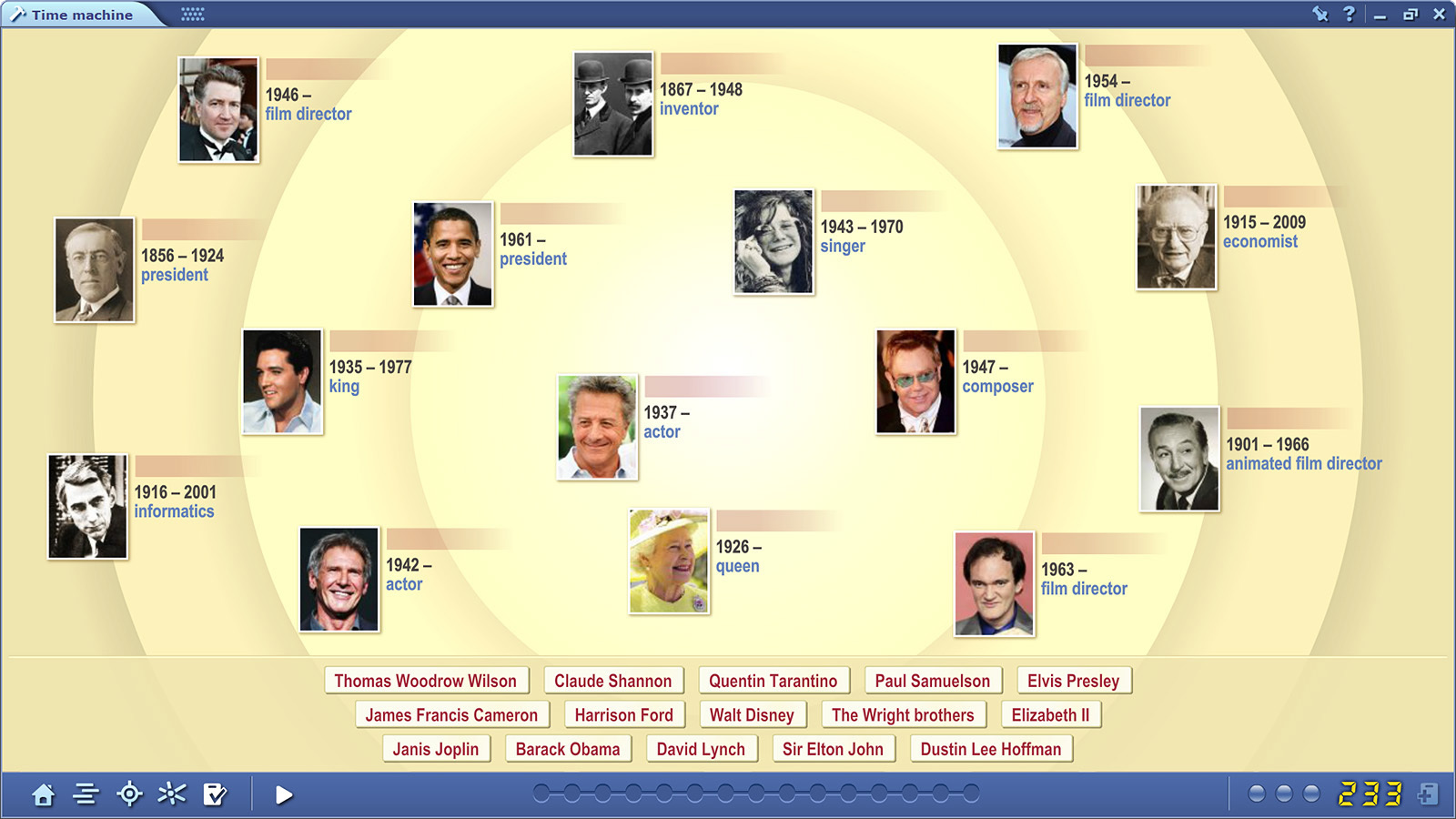 The idea behind the Time Machine educational tool is simple. We wanted to create an interactive educational resource that would show that historical connections are built on much more than just dates. Studying history is one of the best ways to develop logical thinking and learn to build complex connections between separate blocks of information. Time Machine is one of the ways to illustrate this power of History.
The idea behind the Time Machine educational tool is simple. We wanted to create an interactive educational resource that would show that historical connections are built on much more than just dates. Studying history is one of the best ways to develop logical thinking and learn to build complex connections between separate blocks of information. Time Machine is one of the ways to illustrate this power of History.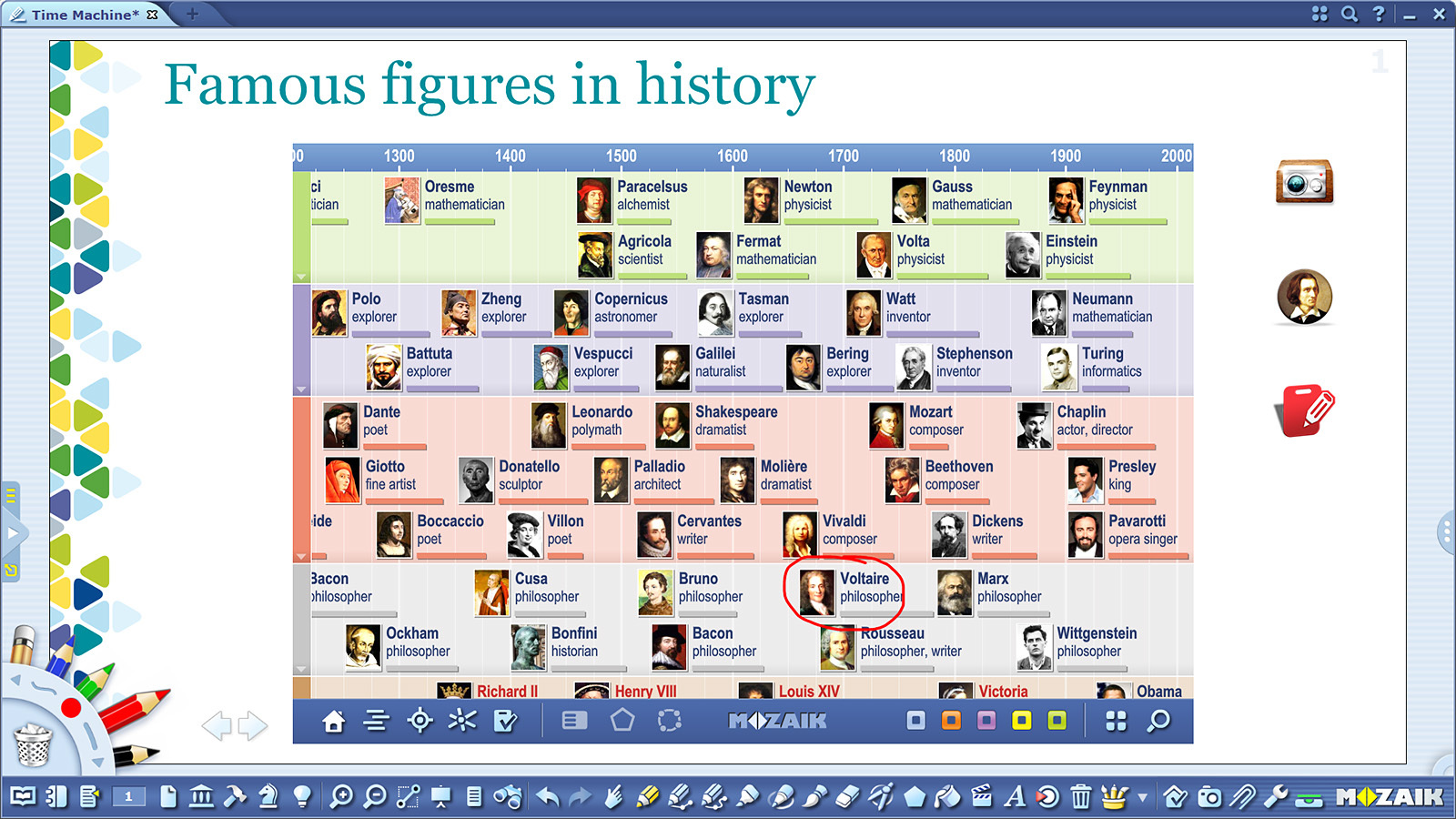 Register on mozaWeb to try Time Machine for yourself, or access the tool in mozaBook. If you'd like to know more about Mozaik's tools for history, read our post about “Hall of Fame,” another great tool in the mozaWeb and mozaBook library.
Register on mozaWeb to try Time Machine for yourself, or access the tool in mozaBook. If you'd like to know more about Mozaik's tools for history, read our post about “Hall of Fame,” another great tool in the mozaWeb and mozaBook library.
Elementary Technology is a distributor of mozaBook and mozaWeb in the UK. Based in Telford, Elementary sells educational products directly to schools, including interactive whiteboards, projectors and visualizers. When we met the folks at Elementary, we knew the combination of their hardware offering with the mozaBook software and interactive content would make a great solution for teachers!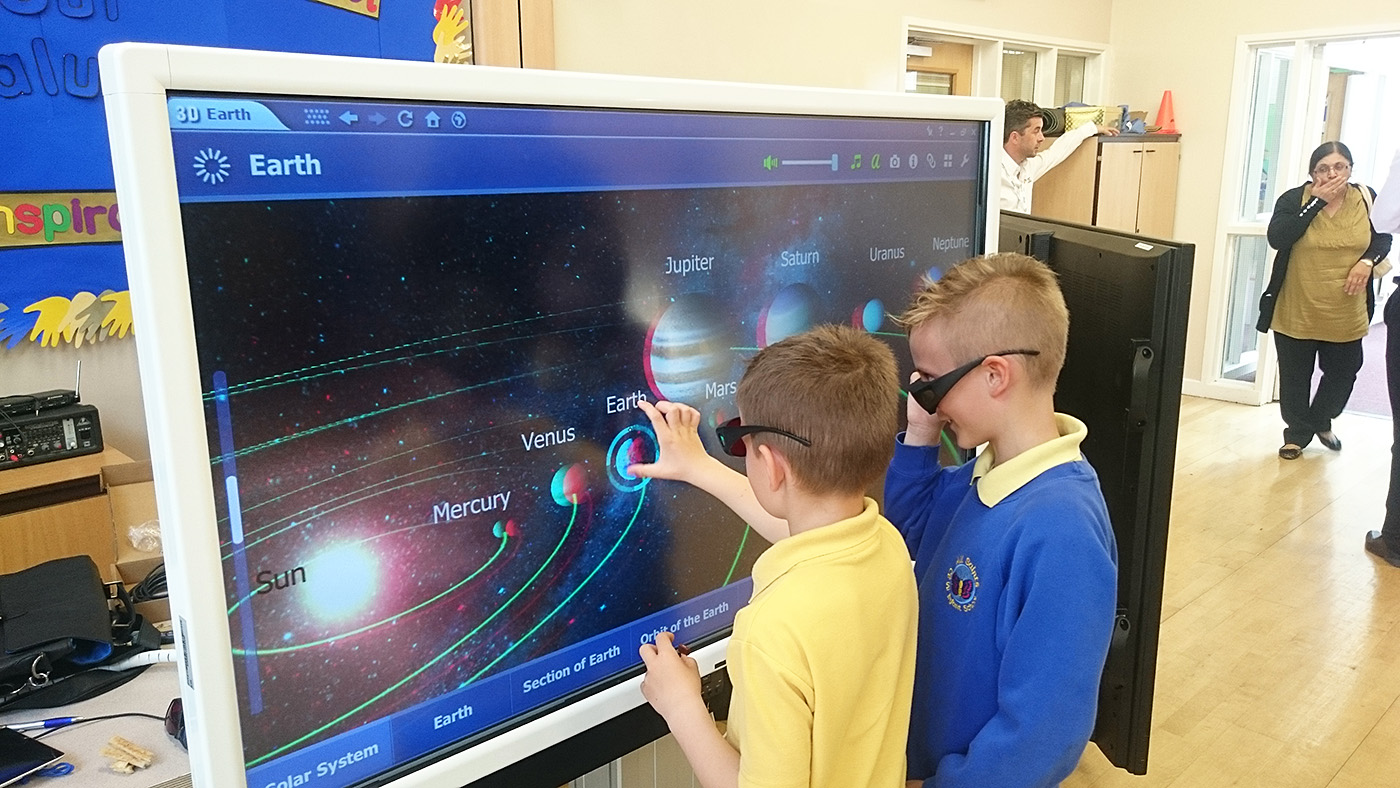
The staff at Elementary are very active in their sales strategy, traveling all around the country, making presentations in primary and secondary schools, as well as attending workshops, conferences and exhibitions, such as the Bett Show. They also organize their own exhibition, inviting many schools and showing off a range of digital education products alongside their commercial partners.
Last year several Elementary employees came to our headquarters in Szeged to participate in one of our partner training sessions. During that time, they learned about the mozaLearn solutions and the ins and outs of using mozaBook. As enthusiastic participants, they even began planning and creating presentations that they could use on their sales tours while they were still here at training.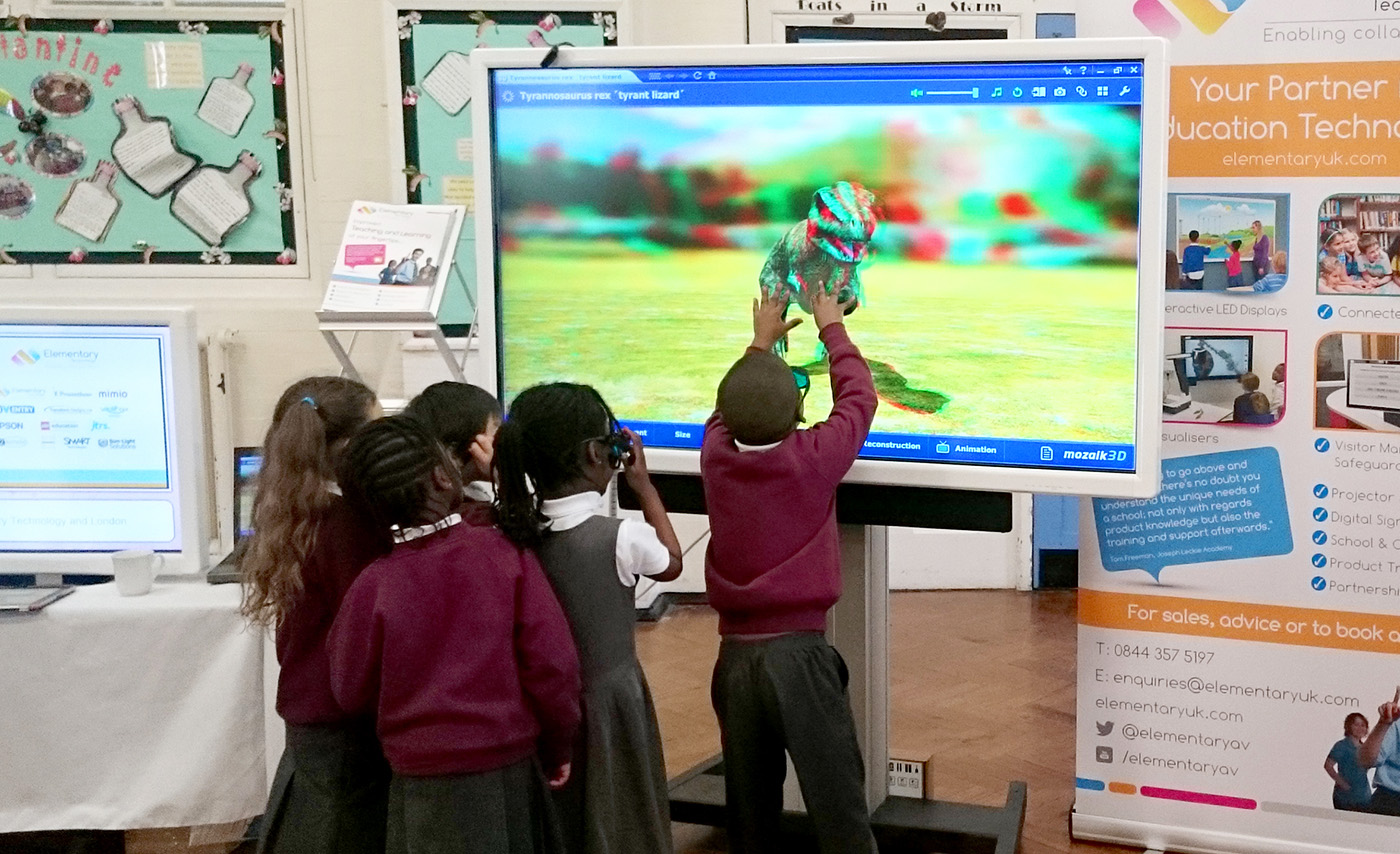
If you’d like to find out where Elementary Technology is going next, check out their social media pages. They regularly share information and photos from their presentations and workshops on their Twitter, YouTube channel and blog.
